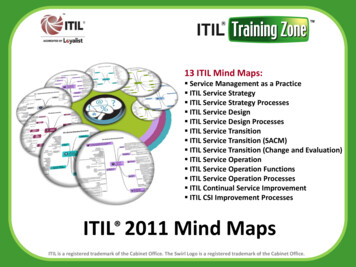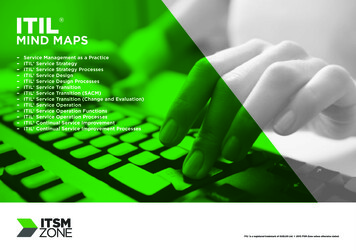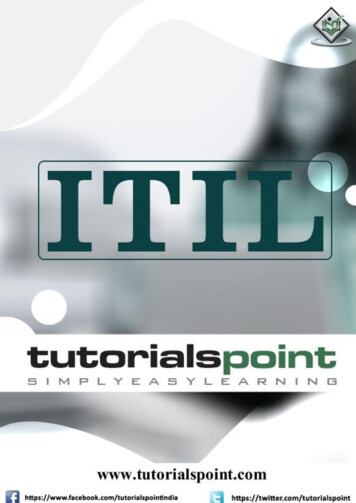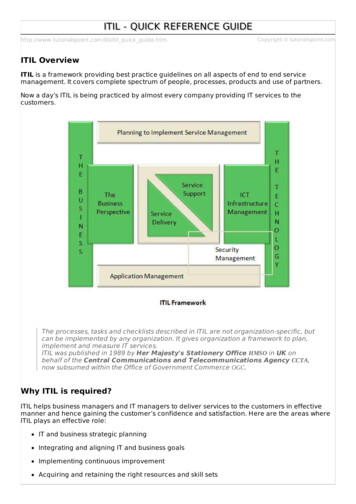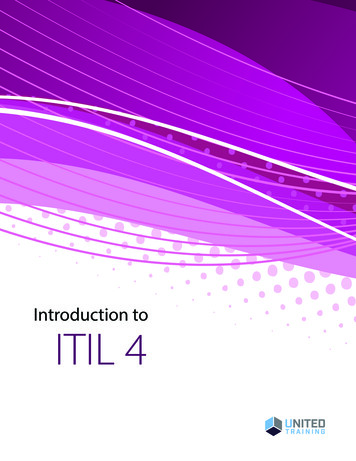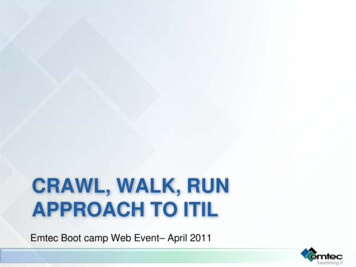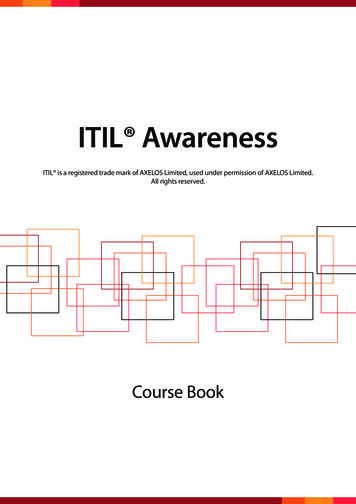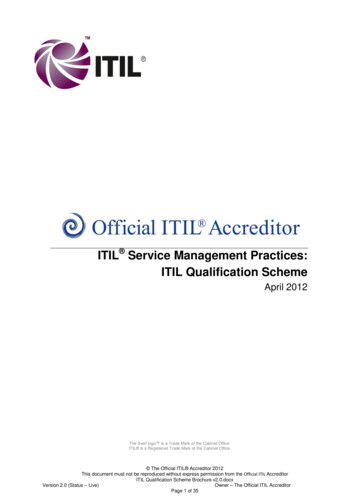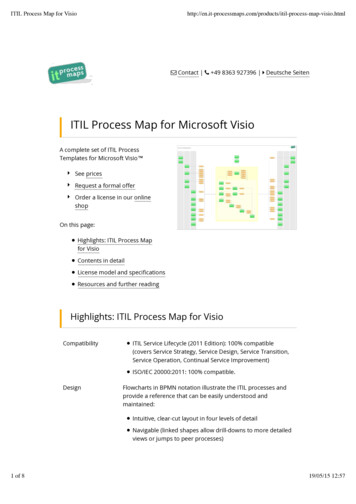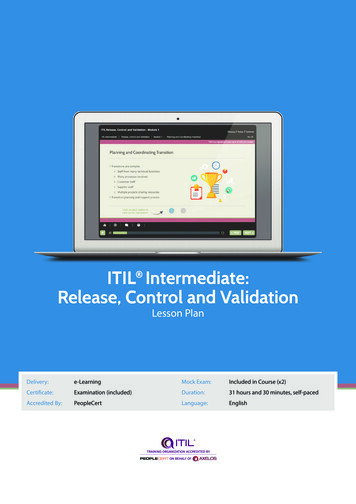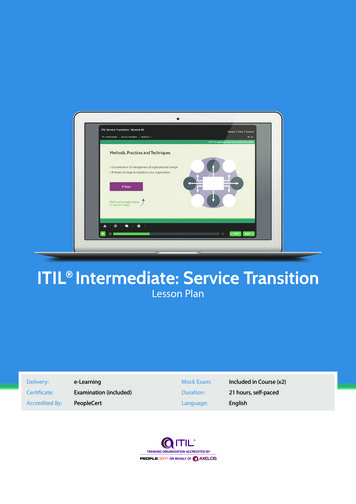
Transcription
ITIL Intermediate: Service DesignLesson PlanDelivery:e-LearningMock Exam:Included in Course (x2)Certificate:Examination (included)Duration:20 hours, self-pacedAccredited By:PeopleCertLanguage:English
ITIL Intermediate: Service Design - Lesson PlanThis Lesson PlanContentsThis lesson plan provides you with all the informationabout the ITIL Service Design e-learning course. Beforeyou begin your studies, please read through thisdocument to help you plan your studying and revisionactivities.Welcome3Prerequisites3Who will Benefit from this Course?3Course Materials3Exercises/Personal Revision3Quizzes4Mock Exams4Taking the ITIL Service Design Exam4How to Book an Exam4Technical SupportHow to Take the Exam4UK 44(0) 8435 235 096USA 1(917) 472-9842support@goodelearning.comWhat does the ITIL Service Design Exam Consist of?4How to Get Help from our ITIL Trainer and Mentor4Detailed Lesson Plan5Good luck!Tutor SupportContact your tutor at any point during the course onitil-tutor@goodelearning.comModule 1: Introduction to Service Design5Module 2: Service Design Principles6Module 3: Service Design Processes7Module 4: Technology Activities8Module 5: Organizing for Service Design9Module 6: Technology Considerations9Module 7: Implementing Service Design9Module 8: Challenges, CSFs and Risks10Module 9: Exam Preparation10ITIL Terminology Copyright 2015 Good e-Learning, all rights reserved. This e-Learning course is delivered by Good e-Learning, and accredited by PeopleCert.No part of this publication may be reproduced, resold, stored in a retrieval system, or distributed in any form or by any means, without the prior permission of the copyright owner.Such requests for permission may be submitted to: marketing@goodelearning.com. Good e-Learning is a trading name used by Educational Systems Ltd.ITIL is a Registered Trademark of AXELOS Ltd.112
ITIL Intermediate: Service Design - Lesson PlanWelcomeWelcome to the ITIL Service Design Certification course.The ITIL Service Design qualification is one of five ITILService Lifecycle Courses and will provide you withguidance that focusses on the design of IT servicesand covers the architectures, processes, policies anddocumentation that will enable you to design servicesthat meet the needs of the organization or programme.This is an accredited, interactive e-learning course forstudents who wish to become certified in ITIL ServiceDesign. As well as in-depth visual learning content, theonline course contains audio and video narratives,quizzes and practice exams.There are 2 objectives of this course. The first is to gainan introductory overview of the Service managementlifecycle, its key processes, roles etc. You also want topass the exam! It is the aim of the course to satisfy both. The course contains a number of videos, with avoiceover commentary. You may stop and start the course whenever you like. Do not try and cover too much material at once; abenefit of e-learning is that you can take your time. Use the quizzes to check that you have understoodthe previous session. Where you have answeredincorrectly, read the guidance, and then review thattopic again. Use the exercises to further consolidate yourlearning. Remember, this course is not just aboutpassing an exam; it is to give you an awareness ofthe importance of IT Service Management in real-life. The Case Study slides show you how the frameworkmight be used in a fictional organization. Remember you can ask the tutor at any time, and willreceive an email reply within 24 hours.PrerequisitesThis course is part of a range of ITIL Intermediate LevelQualifications. Before taking this course you must havesuccessfully completed and passed one of the followingfoundation level qualifications: ITIL v3 or 2011 Foundation, or ITIL v2 Foundation and v2/v3 Foundation Bridge. The ITIL Service Strategy Certificate is part of theITIL Intermediate lifecycle stream, and one of themodules that leads to the ITIL Expert Certificate in ITService Management.ITIL MasterITIL ExpertManaging Across the LifecycleSS SD ST SO CSIOSA PPO RCV SOAIntermediate LifecycleIntermediate CapabilityITIL Foundation Crown Copyright 2011. Reproduced with permission from Axelos LtdWho will Benefit from this Course?This course will be of benefit to any IT professional whoneeds to understand the concepts and activities of ITILService Design at management level, but not specificdetails about each of the supporting processes.It is also suitable if you have completed the ITILFoundation certificate, and you are wishing to advance tohigher level ITIL certifications.Course MaterialsWhen you log in to the course you will have access to thefollowing learning materials.A series of interactive tutorials that cover the followingtopics: Introduction to Service Design Service Design Principles Service Design Processes Service Design Technology Related Activities Organizing for Service Design Technology Considerations Implementation and Improvement of Service Design Challenges, CSFs and Risks Exam PreparationExercises/Personal RevisionThere are a number of exercises which can be used forpersonal revision, to consolidate learning. They also helpto break up the videos. Copyright 2015 Good e-Learning, all rights reserved. This e-Learning course is delivered by Good e-Learning, and accredited by PeopleCert.No part of this publication may be reproduced, resold, stored in a retrieval system, or distributed in any form or by any means, without the prior permission of the copyright owner.Such requests for permission may be submitted to: marketing@goodelearning.com. Good e-Learning is a trading name used by Educational Systems Ltd.ITIL is a Registered Trademark of AXELOS Ltd.3
ITIL Intermediate: Service Design - Lesson PlanQuizzesHow to Take the ExamEvery module ends with a number of multiple choicequiz questions. These match, as far as is possible, theformat of the official exam, and are intended to beequally challenging. By having these quiz sessions aftereach module, you will gain confidence that you aremeeting the learning objectives of this qualification.Because the exam is taken online, you can take it at alocation and time that suits you.Additionally, the course contains the following:Using PeopleCert software, your computer’s webcam andmicrophone records your exam session from start to finish.At the end of the exam, the recorded video and audio isthen sent to PeopleCert, to be reviewed retrospectively by aremote proctor. The proctor will look at the recorded footageto check you have complied with exam guidelines. Exercises in a downloadable exercise booklet, tofurther consolidate your learning. Suggested answers to the exercises in adownloadable booklet. A downloadable copy of the official Acronymsdocument.What does the ITIL Service Design ExamConsist of? A downloadable copy of the official Glossary which isalso available online throughout the course.This is a multiple choice exam consisting of eightscenario-based questions. Two official Mock exams, with answers A number of additional downloadable resourceswhich concentrate on a key concept or process.These resources are part of a library that is growingover time, so keep checking our website:www.goodelearning.comEach question is gradient scored, meaning that youwill have four answer options to choose from, and eachanswer will either be worth five marks, three marks, onemark, or zero marks.Mock ExamsWe strongly encourage you to attempt both mock examsas part of your revision. The mock exams are intendedto closely simulate the exam conditions that you will facewhen taking the real thing. Tutor support is available ifyou are struggling to achieve a pass mark.Taking the ITIL Service Design ExamUpon completing this course you should be able to preparefor the ITIL Service Design Exam. This can be taken online at aplace and time that suits you, using PeopleCert.You will receive the final result within 10 days by e-mail andpost.You will have 90 minutes to complete the exam.The exam is closed book - you cannot make use of anyresources or materials during the exam.There are a maximum of 40 potential marks in thisexam; to pass you must get at least 28 out of 40 markscorrect (70%).How to Get Help from our ITIL Trainerand MentorFor all enquiries, a qualified ITIL Tutor can always bereached by e-mail (itil-tutor@goodelearning.com) orby clicking a link from the ‘support section’ within thecourse. You will receive a response to your ITIL questionor query within 24 hours.PeopleCert is a service that allows you to take yourcertification exam online (virtually) from your own PC orlaptop. If you purchased the course and a voucher for theexam, we will provide the voucher to you on request.How to Book an ExamYou can book a PeopleCert exam via the PeopleCert website.You will first need to create an account by filling in yourpersonal details.In order to book your exam, you will need an ExamVoucher. If you purchased this with your course,when you think you are ready to book, please contactsupport@goodelearning.com and we will send oneimmediately. The exam voucher is valid for 1 year fromthe date of issue. Copyright 2015 Good e-Learning, all rights reserved. This e-Learning course is delivered by Good e-Learning, and accredited by PeopleCert.No part of this publication may be reproduced, resold, stored in a retrieval system, or distributed in any form or by any means, without the prior permission of the copyright owner.Such requests for permission may be submitted to: marketing@goodelearning.com. Good e-Learning is a trading name used by Educational Systems Ltd.ITIL is a Registered Trademark of AXELOS Ltd.4
ITIL Intermediate: Service Design - Lesson PlanDetailed Lesson PlanThe following tables summarize each of the modules, their learning objectives, and the method(s) of delivery. Thetotal studying time required for this course is 20 hours.Module 1: Introduction to Service Design (1 hour, 30 mins)Upon starting Module 1, you will receive detailed instructions for navigating the e-learning course and how to accesssupport for your studies.Session TitleDurationLearning ObjectiveDelivery MethodIntroductionThis module covers the purpose, goals, objectives and scope ofservice design and the business value of service design activities. Thecontext of service design in the ITIL service lifecycle and the inputsand outputs of service design are also covered, including the servicedesign package and service acceptance criteria.Lesson 1: ThePurpose, Objectivesand Scope of ServiceDesignUnderstand and describe: The purpose of service design (SD 1.1.1, 3.2) The goals of service design (SD 1.1.1, 3.2) The objectives of service design (SD 1.1.1, 3.2) The Scope of service design (SD 1.1.2, 3.1.3) Service design’s value to the business (SD 1.1.4, 3.1.4)Video and VoiceoverUnderstand and describe: The context of service strategy in relation to the other 4 stages ofthe service lifecycle (SD 1.2): Service Strategy Service Transition Service Operation Continual Service ImprovementVideo and VoiceoverUnderstand and describe (SD 3.12): Service design inputs and outputs The contents and use of the service design packageVideo and VoiceoverLesson 2: TheContext of ServiceDesign in Relation tothe Service Lifecycle40 mins(for Lesson 1to Lesson 3)Lesson 3: Inputs,Outputs, theSDP and ServiceAcceptable CriteriaQuizThe contents and use of service acceptance criteria (SD Appendix B).12 mins(to include review)5 quiz questions to consolidate learning. Each question has anexplanation provided, and the student may review their answers.Multiple Choice Questions Copyright 2015 Good e-Learning, all rights reserved. This e-Learning course is delivered by Good e-Learning, and accredited by PeopleCert.No part of this publication may be reproduced, resold, stored in a retrieval system, or distributed in any form or by any means, without the prior permission of the copyright owner.Such requests for permission may be submitted to: marketing@goodelearning.com. Good e-Learning is a trading name used by Educational Systems Ltd.ITIL is a Registered Trademark of AXELOS Ltd.5
ITIL Intermediate: Service Design - Lesson PlanModule 2: Service Design Principles (4 hours)Session TitleDurationIntroductionLearning ObjectiveDelivery MethodThe learning objective for this module is to gain sufficient knowledge,to interpret and analyse service design principles, techniques andrelationships and their application to the design of effective servicesolutions.Understand what is involved in: Designing service solutions related to a customer’s needs Designing and utilizing the service portfolio to enhancebusiness value The measurement systems and metrics required The use of service design models to accommodate differentservice solutionsLesson 1: BalancedService DesignUnderstand and describe the following topics: Holistic service design (SD 3.1.1, 3.1.5) Service composition The four Ps, of service design The importance of and approach to balanced design (SD 3.3)Video and VoiceoverLesson 2: ServiceRequirementsUnderstand, describe and apply the following topics: Service requirements and business requirements and drivers(SD 3.4, 3.5) Design activities and constraints (SD 3.6, 3.8, 3.9)Video and VoiceoverLesson 3: Aspectsof Service DesignPart 1Understand, describe and apply the following topics: 5 design aspects in general ( SD 3.1.1, 3.7) 2 aspects of service design (SD 3.7 [Introductory paragraphs priorto SD 3.7.1]) Designing service solutions (SD 3.7.1) Designing supporting systems, especially the service portfolio(SD 3.7.2)Video and VoiceoverLesson 4: Aspectsof Service DesignPart 2Understand, describe and apply the following topics:Video and VoiceoverLesson 5:Service OrientedArchitectureUnderstand, describe and apply the following topics: Service Oriented Architecture (SD 3.10) Service Design Models (SD 3.11)Video and Voiceover2 hours, 40 mins(for lessons 1 to 5)Remaining 5 aspects Technology architectures and management architectures(SD 3.7.3) Designing the processes required (SD 3.7.4) Measurement methods and metrics (SD 3.7.5)Exercise 130 mins(to include review)Inputs and outputs for replacement of a service exerciseTextExercise 220 mins(to include review)Process document template exerciseTextExercise 320 mins(to include review)Service delivery options exerciseTextQuiz12 mins(to include review)5 quiz questions to consolidate learningMultiple Choice Questions Copyright 2015 Good e-Learning, all rights reserved. This e-Learning course is delivered by Good e-Learning, and accredited by PeopleCert.No part of this publication may be reproduced, resold, stored in a retrieval system, or distributed in any form or by any means, without the prior permission of the copyright owner.Such requests for permission may be submitted to: marketing@goodelearning.com. Good e-Learning is a trading name used by Educational Systems Ltd.ITIL is a Registered Trademark of AXELOS Ltd.6
ITIL Intermediate: Service Design - Lesson PlanModule 3: Service Design Processes (7 hours, 30 mins)Session TitleDurationIntroductionLearning ObjectiveDelivery MethodThe module covers the managerial and supervisory aspects ofservice design processes. It excludes the day-to-day operation ofeach process. More detailed process operation guidance is coveredin the service capability courses.Each process is considered from the management perspective.That means at the end of this module you should understand thoseaspects that would be required to understand each process and itsinterfaces, oversee its implementation and judge its effectivenessand efficiency.Lesson 1: DesignCoordinationUnderstand, describe and apply the following topics The purpose and objectives (SD 4.x.1) The scope of the process (SD 4.x.2) Value to the business (SD 4.x.3) The policies, principles and basic concepts which apply to it (SD 4.x.4) High level process activities, methods and techniques (SD 4.x.5) Triggers, inputs, outputs and interfaces (SD 4.x.6) CSFs and KPIs, challenges and risks (SD 4.x.8, SD 4.x.9)Video and VoiceoverLesson 2: ServiceCatalogueManagementUnderstand, describe and apply the following topics: The purpose and objectives (SD 4.x.1) The scope of the process (SD 4.x.2) Value to the business (SD 4.x.3) The policies, principles and basic concepts which apply to it (SD 4.x.4) High level process activities, methods and techniques (SD 4.x.5) Triggers, inputs, outputs and interfaces (SD 4.x.6) CSFs and KPIs, challenges and risks (SD 4.x.8, SD 4.x.9)Video and VoiceoverLesson 3: ServiceLevel ManagementUnderstand, describe and apply the following topics The purpose and objectives (SD 4.x.1) The scope of the process (SD 4.x.2) Value to the business (SD 4.x.3) The policies, principles and basic concepts which apply to it (SD 4.x.4) High level process activities, methods and techniques (SD 4.x.5) Triggers, inputs, outputs and interfaces (SD 4.x.6) CSFs and KPIs, challenges and risks (SD 4.x.8, SD 4.x.9)Video and VoiceoverLesson 4: AvailabilityManagementUnderstand, describe and apply the following topics: The purpose and objectives (SD 4.x.1) The scope of the process (SD 4.x.2) Value to the business (SD 4.x.3) The policies, principles and basic concepts which apply to it (SD 4.x.4) High level process activities, methods and techniques (SD 4.x.5) Triggers, inputs, outputs and interfaces (SD 4.x.6) CSFs and KPIs, challenges and risks (SD 4.x.8, SD 4.x.9)Video and VoiceoverLesson 5: CapacityManagementUnderstand, describe and apply the following topics The purpose and objectives (SD 4.x.1) The scope of the process (SD 4.x.2) Value to the business (SD 4.x.3) The policies, principles and basic concepts which apply to it (SD 4.x.4) High level process activities, methods and techniques (SD 4.x.5) Triggers, inputs, outputs and interfaces (SD 4.x.6) CSFs and KPIs, challenges and risks (SD 4.x.8, SD 4.x.9)Video and VoiceoverLesson 6: ITService ContinuityManagementUnderstand, describe and apply the following topics: The purpose and objectives (SD 4.x.1) The scope of the process (SD 4.x.2) Value to the business (SD 4.x.3) The policies, principles and basic concepts which apply to it (SD 4.x.4) High level process activities, methods and techniques (SD 4.x.5) Triggers, inputs, outputs and interfaces (SD 4.x.6) CSFs and KPIs, challenges and risks (SD 4.x.8, SD 4.x.9)Video and VoiceoverLesson 7:Information SecurityManagementUnderstand, describe and apply the following topics: The purpose and objectives (SD 4.x.1) The scope of the process (SD 4.x.2) Value to the business (SD 4.x.3) The policies, principles and basic concepts which apply to it (SD 4.x.4) High level process activities, methods and techniques (SD 4.x.5) Triggers, inputs, outputs and interfaces (SD 4.x.6) CSFs and KPIs, challenges and risks (SD 4.x.8, SD 4.x.9)Video and Voiceover5 hours, 5 mins(for lessons 1 to 8) Copyright 2015 Good e-Learning, all rights reserved. This e-Learning course is delivered by Good e-Learning, and accredited by PeopleCert.No part of this publication may be reproduced, resold, stored in a retrieval system, or distributed in any form or by any means, without the prior permission of the copyright owner.Such requests for permission may be submitted to: marketing@goodelearning.com. Good e-Learning is a trading name used by Educational Systems Ltd.ITIL is a Registered Trademark of AXELOS Ltd.7
ITIL Intermediate: Service Design - Lesson PlanLesson 8: SupplierManagementUnderstand, describe and apply the following topics: The purpose and objectives (SD 4.x.1) The scope of the process (SD 4.x.2) Value to the business (SD 4.x.3) The policies, principles and basic concepts which apply to it (SD 4.x.4) High level process activities, methods and techniques (SD 4.x.5) Triggers, inputs, outputs and interfaces (SD 4.x.6) CSFs and KPIs, challenges and risks (SD 4.x.8, SD 4.x.9)Video and VoiceoverExercise 120 mins(to include review)Service design policies and principles exerciseTextExercise 230 mins(to include review)Service catalogue exerciseTextExercise 315 mins(to include review)Service level management exerciseTextExercise 420 mins(to include review)Availability management exerciseTextExercise 520 mins(to include review)Capacity plan exerciseTextExercise 620 mins(to include review)ITSCM plan exerciseTextQuiz20 mins(to include review)8 quiz questions to consolidate learningMultiple Choice QuestionsModule 4: Technology Activities (1 hour, 30 mins)Session TitleDurationLearning ObjectiveDelivery MethodIntroductionUnderstand: Management of technology related activities commonlyperformed in the service design stage Service design activities and techniques within requirementsengineering Data and information management Application managementLesson 1: DesignActivities forRequirementsEngineeringUnderstand and describe: Service design activities and techniques within requirementsengineering (SD 5.1)Video and VoiceoverUnderstand and describe: Service design activities and techniques within dataand information management and associated with applicationmanagement (SD 5.2, SD 5.3)Video and VoiceoverLesson 2: Dataand InformationManagement1 hour(for Lessons 1and 2)Exercise20 mins(to include review)Requirement catalog exerciseTextQuiz12 mins(to include review)5 quiz questions to consolidate learningMultiple Choice Questions Copyright 2015 Good e-Learning, all rights reserved. This e-Learning course is delivered by Good e-Learning, and accredited by PeopleCert.No part of this publication may be reproduced, resold, stored in a retrieval system, or distributed in any form or by any means, without the prior permission of the copyright owner.Such requests for permission may be submitted to: marketing@goodelearning.com. Good e-Learning is a trading name used by Educational Systems Ltd.ITIL is a Registered Trademark of AXELOS Ltd.8
ITIL Intermediate: Service Design - Lesson PlanModule 5: Organizing for Service Design (1 hour, 30 mins)Session TitleDurationLearning ObjectiveDelivery MethodIntroductionThis module covers: Service design roles, responsibilities and capabilities Techniques for assigning roles are introduced and explainedLesson 1:Organizing forService StrategyThis lesson covers: Aspects associated with the service design roles, responsibilitiesand capabilities ( SD 3.7.4.1, 3.7.4.2, 6.3, 6.4) The functions within service design (SD 6.2)Video and VoiceoverThis lesson covers: Roles and responsibilities within the service design lifecycle stagefor each of the service design processes (SD 6.3)Video and VoiceoverLesson 2: Roles50 mins(for Lesson 1 andLesson 2 together)Exercise30 mins(to include review)Organizing for service design RACITextQuiz12 mins(to include review)5 quiz questions to consolidate learningMultiple Choice QuestionsModule 6: Technology Considerations (1 hour)Session TitleDurationIntroductionLearning ObjectiveDelivery MethodThis module covers technology considerations for service design.Lesson 1:TechnologyConsiderations inService Design30 minsThis module enables understanding of the following: Interpret and analyse technology considerations in service design Upon completion, students should understand what is involved in The types of tools that would benefit service design(SD 7 [introductory paragraphs prior to SD 7.1]) The requirements for service management tools (SD 7.2)Video and VoiceoverExercise20 mins(to include review)Technology considerations exerciseTextQuiz12 mins(to include review)5 quiz questions to consolidate learningMultiple Choice QuestionsModule 7: Implementing Service Design (1 hour)Session TitleDurationIntroductionLearning ObjectiveDelivery MethodThis module covers the service design issues, prerequisites forsuccess, and the six stage implementation approach. Pertinenttechniques are addressed and reviewed, business impact analysis,service level requirements and risks assessment.Lesson 1:ImplementingService Design50 minsUpon completion, students should understand what is involved in: The service design issues relating to business impact analysis,service level requirements and risks (SD 8.1, 8.2, 8.3) The six-stage implementation approach (SD 8.4) Measurements of service design, as a prerequisite for success (SD 8.5)Video and VoiceoverQuiz12 mins(to include review)5 quiz questions to consolidate learningMultiple Choice Questions Copyright 2015 Good e-Learning, all rights reserved. This e-Learning course is delivered by Good e-Learning, and accredited by PeopleCert.No part of this publication may be reproduced, resold, stored in a retrieval system, or distributed in any form or by any means, without the prior permission of the copyright owner.Such requests for permission may be submitted to: marketing@goodelearning.com. Good e-Learning is a trading name used by Educational Systems Ltd.ITIL is a Registered Trademark of AXELOS Ltd.9
ITIL Intermediate: Service Design - Lesson PlanModule 8: Challenges, CSFs and Risks (1 hour)Session TitleDurationIntroductionLearning ObjectiveDelivery MethodThis module covers the challenges and risks facing service designand how critical success factors (CSF) contribute to service design.Lesson 1:Challenges, CSFsand Risks30 minsThis module enables you to understand the challenges, risks andcritical success factors relating to service design (SD 9.1, 9.2, 9.3)Video and VoiceoverExercise20 mins(to include review)Challenges for service design exerciseTextQuiz12 mins(to include review)5 quiz questions to consolidate learningMultiple Choice QuestionsModule 9: Exam Preparation (2 hours)Session TitleDurationLearning ObjectiveDelivery MethodExam Preparation2 hoursThis module summarizes the material covered in the previousmodules and prepares candidates for the examination. It is likelythat most course providers will wish to offer and review at least oneopportunity for a mock examination.Video and Voiceover Copyright 2015 Good e-Learning, all rights reserved. This e-Learning course is delivered by Good e-Learning, and accredited by PeopleCert.No part of this publication may be reproduced, resold, stored in a retrieval system, or distributed in any form or by any means, without the prior permission of the copyright owner.Such requests for permission may be submitted to: marketing@goodelearning.com. Good e-Learning is a trading name used by Educational Systems Ltd.ITIL is a Registered Trademark of AXELOS Ltd.10
ITIL Intermediate: Service Design - Lesson PlanITIL TerminologyAfter studying this course you should be able to understand the meanings of the following terms in the context ofservice design. A full ITIL glossary with definitions is available from within the course and as a PDF download.AccountingEnhancing ServiceProject PortfolioAnalytical ModellingExcitement FactorReal ChargingApplication PortfolioExternal CustomerReturn on Investment ManagerAssetExternal Service ProviderService AnalyticsBillingFinancial YearService CatalogueBudgetingFixed CostService ContractBusiness CaseFunction Service CharterBusiness Impact AnalysisIndirect CostService Knowledge ManagementSystemBusiness ObjectiveInsourcingBusiness RelationshipInternal CustomerBusiness UnitInternal Rate of ReturnCapabilityInternal Service ProviderCapacity PlanISO 9001Capital CostISO/IEC 20000Change ProposalIT Service ManagementCharging PolicyIT Steering GroupContractKano ModelControl PerspectiveManagement InformationCore ServiceManagement SystemCost CentreMarket SpaceCost ElementMissionCost ModelModellingCost TypeNear-ShoreCost UnitNet Present ValueCSI RegisterNetworkCustomer AgreementNotional ChargingCustomer PortfolioOff-Shore ValueCustomer-Facing ServiceOn-ShoreDepreciationOperational CostDesign Co-ordinationOpportunity CostDirect CostPattern of Business ActivityEconomies of encyProfit CentreEnabling ServiceProjectService Level AgreementService ModelService OptionService OwnerService PortfolioService ProviderService Provider InterfaceSupplierSupporting ServiceTotal Cost of UtilizationType I Service ProviderType II Service ProviderType III Service ProviderUnit CostUser ProfileValue ChainVision Copyright 2015 Good e-Learning, all rights reserved. This e-Learning course is delivered by Good e-Learning, and accredited by PeopleCert.No part of this publication may be reproduced, resold, stored in a retrieval system, or distributed in any form or by any means, without the prior permission of the copyright owner.Such requests for permission may be submitted to: marketing@goodelearning.com. Good e-Learning is a trading name used by Educational Systems Ltd.ITIL is a Registered Trademark of AXELOS Ltd.11
service design and the business value of service design activities. The context of service design in the ITIL service lifecycle and the inputs and outputs of service design are also covered, including the service design package and service acceptance criteria. Lesson 1: The Purpose, Objectives and Scope of Service Design 40 mins (for Lesson 1
